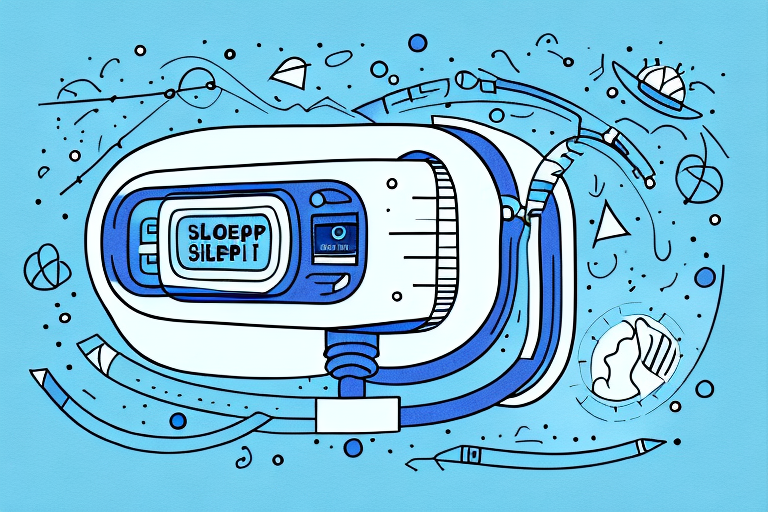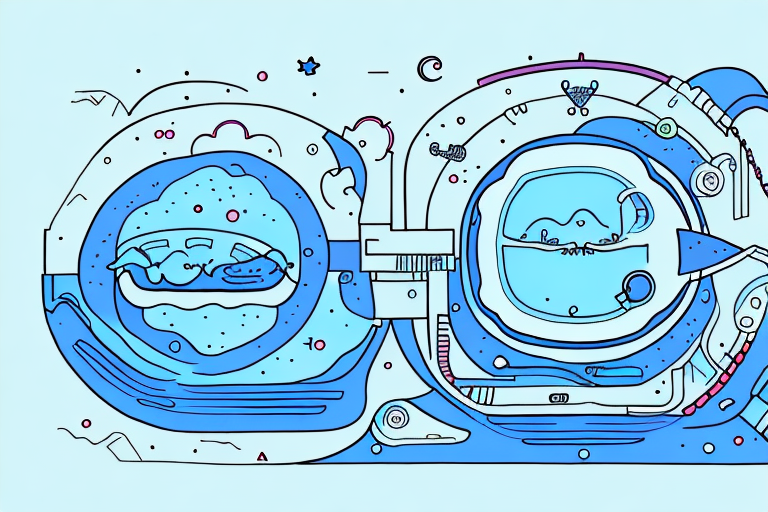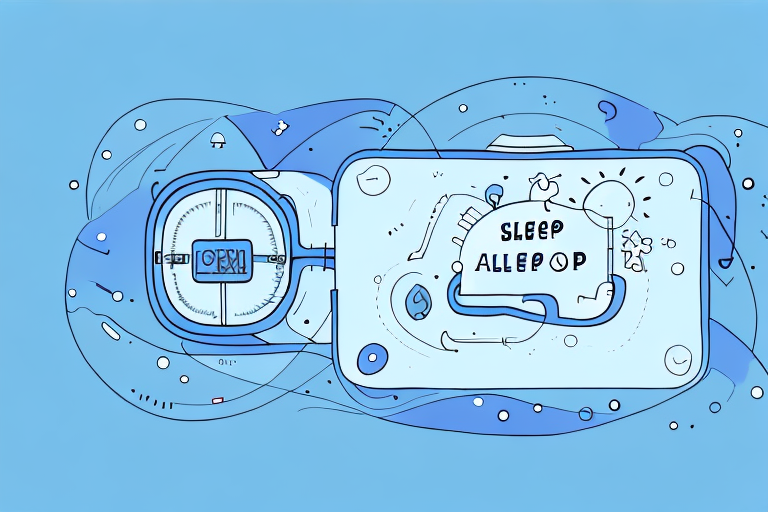Sleep apnea is a common sleep disorder that affects people of all ages, although it is most prevalent among middle-aged and older adults. The condition occurs when a person’s breathing is interrupted or disrupted during sleep, causing them to briefly awaken or gasp for air.
While there are several treatment options available for sleep apnea, many people rely on sleep apnea machines to maintain adequate breathing and improve the quality of their sleep. In this article, we will delve into the science behind sleep apnea machine and their impact on sleep quality.
Understanding Sleep Apnea: Causes and Symptoms
Sleep apnea is a complex disorder that can have many underlying causes. In general, it occurs when the muscles at the back of the throat fail to keep the airway open during sleep, leading to partial or complete blockage and resulting in a disruption in breathing. Some common risk factors for sleep apnea include obesity, aging, smoking, and alcohol consumption, although the condition can affect anyone regardless of their age or lifestyle habits.
Obesity is a major risk factor for sleep apnea, as excess weight can put pressure on the airway and cause it to collapse during sleep. In addition, aging can also increase the risk of sleep apnea, as the muscles in the throat and tongue may become weaker over time. Smoking and alcohol consumption can also contribute to sleep apnea by causing inflammation and swelling in the airway.

What is Sleep Apnea?
Sleep apnea is a sleep disorder characterized by brief interruptions in breathing during sleep. These interruptions, or apneas, can last anywhere from a few seconds to several minutes and can occur dozens or even hundreds of times during the night. Although most people with sleep apnea are unaware of these interruptions, the condition can significantly impact the quality of their sleep and lead to a range of health problems over time.
In addition to the physical health risks associated with sleep apnea, the condition can also have a negative impact on mental health and well-being. People with sleep apnea may experience depression, anxiety, and irritability due to the disruption in their sleep patterns.
Types of Sleep Apnea
There are two main types of sleep apnea: obstructive sleep apnea and central sleep apnea. Obstructive sleep apnea (OSA) is the most common type, occurring when the airway is blocked or partially blocked during sleep due to the collapse of the soft tissue in the back of the throat. Central sleep apnea (CSA), on the other hand, is less common and occurs when the brain fails to signal the muscles to breathe during sleep.
It is important to note that some people may have a combination of both obstructive and central sleep apnea, known as mixed sleep apnea. This can make diagnosis and treatment more complex, as different approaches may be needed to address both types of apnea.
Common Symptoms and Health Risks
Some common symptoms of sleep apnea include loud snoring, gasping or choking during sleep, excessive daytime sleepiness, headaches, and difficulty concentrating. In addition, sleep apnea has been linked to an increased risk of several health problems, including high blood pressure, heart disease, stroke, and type 2 diabetes.
It is important to seek medical attention if you suspect you may have sleep apnea, as early diagnosis and treatment can help improve your quality of life and reduce the risk of associated health problems.
The Science of Sleep Apnea Machines
Sleep apnea is a serious sleep disorder that affects millions of people worldwide. It is characterized by interruptions in breathing during sleep, which can lead to a host of health problems, including high blood pressure, heart disease, and stroke. Fortunately, sleep apnea machines have been developed to help people with this condition get a good night’s sleep and improve their overall health.
While sleep apnea machines may seem like a simple solution to a complex problem, the science behind them is actually quite fascinating. In this article, we’ll explore the different types of sleep apnea machines available and how they work to maintain airway patency during sleep.

Continuous Positive Airway Pressure (CPAP) Machines
CPAP machines are the most commonly used type of sleep apnea machine. They work by delivering a constant stream of pressurized air through a mask or nasal pillows to keep the airway open during sleep. This pressure helps to prevent the soft tissue in the back of the throat from collapsing and blocking the airway, which can cause interruptions in breathing.
CPAP machines have been shown to be highly effective in improving sleep quality and reducing the symptoms of sleep apnea. However, they can take some getting used to, and it may take several weeks or even months to adjust to sleeping with a mask or nasal pillows.
Bi-Level Positive Airway Pressure (BiPAP) Machines
BiPAP machines work in a similar way to CPAP machines, but they deliver two different levels of pressure: a higher pressure during inhalation and a lower pressure during exhalation. This can be particularly helpful for people with certain medical conditions, such as chronic obstructive pulmonary disease (COPD), who require more support during inhalation.
BiPAP machines are also useful for people who have difficulty tolerating the constant pressure of a CPAP machine. The lower pressure during exhalation can make it easier to breathe out, which can make the machine more comfortable to use.
Adaptive Servo-Ventilation (ASV) Machines
ASV machines are designed to monitor a person’s breathing patterns during sleep and adjust the pressure accordingly. This can be particularly helpful for people with complex sleep apnea, which is a combination of obstructive and central sleep apnea.
ASV machines are also useful for people who have difficulty tolerating the constant pressure of a CPAP machine. The machine can adjust the pressure based on the person’s breathing patterns, which can make it more comfortable to use.
How Sleep Apnea Machines Maintain Airway Patency
Sleep apnea machines work by delivering pressurized air through the airway, which helps keep the soft tissue in the back of the throat from collapsing and blocking the airway. This can help reduce the number of apneas during sleep, improve sleep quality, and reduce the symptoms of sleep apnea over time.
However, it’s important to note that sleep apnea machines are not a cure for sleep apnea. They are a treatment option that can help manage the symptoms of the condition and improve overall health. In addition to using a sleep apnea machine, it’s important to make lifestyle changes, such as losing weight, quitting smoking, and avoiding alcohol and sedatives, which can worsen sleep apnea symptoms.
If you think you may have sleep apnea, it’s important to talk to your doctor. They can help you determine the best treatment options for your individual needs and help you get the good night’s sleep you deserve.
The Impact of Sleep Apnea Machines on Sleep Quality
Using a sleep apnea machine can have a significant impact on the quality of your sleep and your overall health and well-being. Sleep apnea is a common sleep disorder that affects millions of people worldwide. It is characterized by interruptions in breathing during sleep, which can lead to a range of negative health outcomes, including increased risk of heart disease, stroke, and diabetes.
Here are just a few of the benefits associated with using sleep apnea machines:
Improvements in Sleep Duration and Continuity
By reducing the number of apneas during sleep, sleep apnea machines can help improve the overall duration and continuity of your sleep. This means that you may spend more time in deep, restorative sleep, which can help you feel more rested and energized during the day. Additionally, better sleep quality may even improve your mood and cognitive function over time.
Studies have shown that people who use sleep apnea machines experience fewer awakenings during the night and spend more time in the deeper stages of sleep. This can lead to improvements in memory consolidation, learning, and overall cognitive function.
Reduction in Daytime Sleepiness and Fatigue
One of the most common symptoms of sleep apnea is excessive daytime sleepiness. This can make it difficult to concentrate, perform daily tasks, and even drive safely. By improving the quality of your sleep, sleep apnea machines can help reduce feelings of fatigue and promote greater alertness during the day.
Many people who use sleep apnea machines report feeling more awake and alert during the day, with fewer episodes of drowsiness or nodding off. This can lead to improvements in productivity, mood, and overall quality of life.
Enhanced Cognitive Function and Mood
Poor sleep quality has been linked to a range of cognitive and mood problems, including decreased cognitive function, memory problems, and depression. By improving the quality of your sleep, sleep apnea machines can help mitigate these issues and promote better overall mental health.
Studies have shown that people who use sleep apnea machines experience improvements in cognitive function, including memory, attention, and processing speed. Additionally, better sleep quality has been linked to improvements in mood and a reduced risk of developing depression.
In conclusion, using a sleep apnea machine can have a significant impact on your overall health and well-being. By improving the quality of your sleep, you may experience improvements in sleep duration and continuity, reductions in daytime sleepiness and fatigue, and enhanced cognitive function and mood. If you suspect that you may have sleep apnea, talk to your healthcare provider about whether a sleep apnea machine may be right for you.

Selecting the Right Sleep Apnea Machine for You
Choosing the right sleep apnea machine can be a difficult and confusing process, but it is an important decision that can have a significant impact on your sleep quality and overall health. Here are some tips for selecting the right sleep apnea machine for you:
Consulting with a Sleep Specialist
If you think you may have sleep apnea, it is important to consult with a sleep specialist or physician. They can help diagnose your condition and recommend the best treatment options for your needs.
Factors to Consider When Choosing a Machine
When selecting a sleep apnea machine, there are several factors to consider, including your budget, lifestyle, and medical needs. Be sure to research different machines and speak with a healthcare professional before making a final decision.
Understanding Your Insurance Coverage and Costs
Sleep apnea machines can be expensive, so it is important to understand your insurance coverage and any out-of-pocket costs associated with your treatment. Be sure to speak with your insurance provider and healthcare professional to learn more about your options.
Overall, sleep apnea machines can be highly effective in improving sleep quality and reducing the symptoms of sleep apnea. By understanding the science behind these devices and selecting the right machine for your needs, you can take the first step towards better sleep and better health.
More to read: Solutions for People Snoring with Using CPAP Masks

